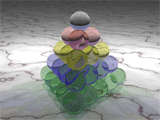 "File:Pyramid of 35 spheres animation.gif" by Blotwell is licensed under CC BY-SA 3.0
"File:Pyramid of 35 spheres animation.gif" by Blotwell is licensed under CC BY-SA 3.0
Describing stuff is hard! You might have an amazing image in your mind of a fantastical structure or environment. Yet, when you describe it to your players, you are met with a blank stare and a few questioning looks. Dungeon Masters, we have all had this happen at some point, here is one problem that you can avoid.
Do not and I repeat, do not describe a scene using synonyms of the same word! It seems in the realm of common sense. Yet, it is the biggest mistake that I see many dungeon masters make, including myself. Normally, this type of problem arises when describing a scene that was not all the way thought through. Often the thought of, "Describing that shouldn't be too hard" occurring before a session is too blame.
Today is the day that this problem is tackled through the gif above. The not so great description of this gif would be "A Round Circular Globular Spherical Pyramid-Like Triangular Stack of Objects." It gets the point across that there is something of the sort there, but it lacks any real description. Players know it is a stack of spheres stacked in a pyramid. Yet, they do not know the colors, the spin, or translucency of the objects, and they may have been confused about the long-winded description.
This trap of giving a long description without any real details is what will ruin a scene for many and should be realized. Though realization that something is wrong is not enough. How can a dungeon master improve their description?
Don't make it complicated and stick to the point! There is a stack of various colored spheres stacked in a pyramid-like pattern. They are translucent and are ordered in these colors from the bottom up: green, blue, yellow, red, white. In this description there is no repeating of the same detail. Instead of rehashing only the essentials, the scene builds up from the basics into something more. Hopefully this can prevent those moments of describing a stone as a "dull, gray, boring, smooth, small, miniscule, pebble," and what are your own experiences with this type of problem?
No comments:
Post a Comment